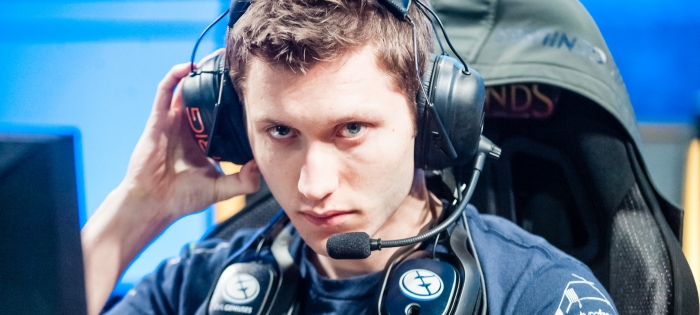At the age of 23, Stephen “Snoopeh” Ellis has retired from professional video gaming. The former eSports star from Evil Geniuses is now the vice president of global business development at Unikrn, an eSports start-up that focuses on betting. Ellis, who’s from Stirling, Scotland, has been playing PC games like Age of Empires and Medal of Honor since he was 6 years old. He remained hooked on games like Eve Online, Battlefield Heroes, and Counter-Strike until he was introduced to League of Legends. He spent four years playing professionally for SK Gaming, Counter Logic Gaming EU, and Evil Geniuses. Now he’s taking his eSports experience and his honors degree in computer science and business management to his second career, while remaining entrenched in the burgeoning eSports business. Ellis talks about the impact betting will have on the rise of eSports in this exclusive interview.
How did you first get involved in eSports as a pro gamer?
I initially got involved in eSports when I was scouted on the top European ladder in 2011. I was considered one of the best players in my role at the time (out of the millions playing). After being a substitute for SK Gaming at Gamescom in 2011, I quickly replaced the current jungler at the time, and within just a few weeks our team had qualified for Intel Extreme Masters (IEM) Guangzhou in China and IEM New York, where we placed 3rd and 2nd respectively.
How did you see eSports grow over the years?
When I first got into professional gaming, we were playing for only a few hundred dollars with maybe a couple of hundred spectators. I’ve watched eSports grow from players earning no salaries to earning well over six figures and having millions of people watching them globally, with 43,000 people filling a stadium to watch two of the world’s best teams duke it out. The production quality of some of our events rivals that of traditional sports, and viewership as well as viewer engagement trumps them. It’s a remarkable industry to be a part of right now.
 Stephen “Snoopeh” Ellis
Stephen “Snoopeh” Ellis
What role has Riot Games played in the growth of overall eSports over the years?
Riot Games has played a critical role in the growth of eSports as a whole. They were the first developer to significantly invest in eSports, creating infrastructure akin to traditional sports and hiring hundreds of employees who specifically cater to developing and maintaining the European and North American LCS (League Championship Series), as well as their other leagues in different territories such as China, Korea, Latin America, Oceania, Turkey, and South East Asia. This has led to other developers now taking a more active role in catering to their competitive community, each implementing different strategies but most importantly actively investing in eSports.
What impact has livestreaming had on the growth of eSports?
The large growth spike we had for eSports in 2011 is the result of various factors, but livestreaming is without a doubt one of the biggest catalysts for the growth we have seen over the past few years. There were various incarnations of live streamingservices, but it wasn’t until Twitch.tv came along that things really took off for eSports — we could now reach a global audience with relatively low set-up costs. You could connect with millions of people from your bedroom!
How did you utilize social media to work with sponsors and your own brand in eSports?
Social Media plays an integral part in engaging with my fans and promoting my sponsors. One thing that is unique with eSports is that the talent is very heavily involved with the community, and the community feels actively involved with the talent. There are no agents or PR team acting as a barrier to the community/fans, which can be a great platform to create brand loyalty for your sponsorships. I had overwhelming support from my fans on social media, congratulating me when we won or supporting me when we lost. I owe a large part of my success to their continued support.
What impact have you seen Twitch’s acquisition of Evil Geniuses’ parent company, Good Game, had on the company?
When I first heard of the Twitch acquisition of Good Game, I had a very negative perception. I understand the strategic benefits of such a relationship but it felt like it was a disservice to the players, whom I’m a huge advocate of. The players are the core of our industry and we cannot afford to forget that. If we are going to implement support for the teams, we have to ensure that is passed onto the players or a separate entity offering that support network that the players need. With that said, I believe Twitch, a company spawned by eSports enthusiasts, will continue to do their best to ensure everyone in the ecosystem, especially the players, will be taken care of.
When did you know it was time to retire?
It sounds ridiculous to say you have retired at the age of 23, when my professional career really only started at 19. It wasn’t an easy decision. I hadn’t yet won the world championship, which was my ultimate goal as a professional player. However, I had the opportunity to travel all over the world and living in South Korea, China, Germany, and Los Angeles. I had hundreds of thousands of fans supporting me throughout my career, and I met so many amazing people on my journey, and I had the ability to inspire thousands of kids across the world. I was ready to start the next chapter and help the next generation of professional players and further develop the eSports ecosystem.
Why did you decide to join Unikrn?
I spent many months deliberating what exactly I wanted to do next. I had very compelling offers from some of the largest and most successful organizations in eSports, but I kept finding myself wanting to grow something from the ground up. When I met the guys at Unikrn in Seattle a few months ago, I couldn’t wait to work with them. They are a great bunch and I believe in our vision as a company. We can create the safest platform for wagering in eSports globally in our partnership with TabCorp and offer a level of engagement in eSports which traditional sports already benefit from.
What specifically will your job be?
As VP of Business Development, I’ll be actively working to shape the direction we take as a company in several ways. I’ll be helping develop strategic partnerships with key individuals and orgs throughout the industry. I’m responsible for interacting with the community on Unikrn’s behalf, taking feedback and using my experience in the industry to help deliver the best possible product.
What do you feel differentiates Unikrn from other eSports companies like Proxy, AlphaDraft and Vulcun?
It’s great to see other companies involved in the eSports industry, but we are completely different. The main difference with Unikrn is that we are not fantasy-based wagering. Unikrn is simple, it’s just betting. Customers can bet on the outcome of the week’s biggest matches to selecting the winner of the entire tournament. Fantasy requires deep knowledge of the space and the players, the learning curve is higher. We also have plans to offer new betting products in the future.
How much room do you see for fantasy and betting in eSports?
Well, there were 205 million viewers of eSports last year. The reason Unikrn is passionate about bringing betting to eSports is because we want to help drive more mainstream engagement. In terms of how much room there is, it’s a global marketplace. So unlike other sporting events, which tend to be localized, eSports is a global movement.
How does this change the engagement of eSports for fans?
Quite frankly, there’s no better way to increase engagement on any sport than through betting. The cool thing about eSports is people watch in person and online for multiple days. When they’re online they tend to chat with each other, betting just makes it that much more interesting and engaging.
From a player perspective, what opportunities does this open up?
We at Unikrn know that there is strong evidence of traditional sports betting growing and engaging mainstream audiences, and we believe that eSports can and will follow suit. Adam Silver, the Commissioner of the NBA, recently came out with strong support for betting in traditional sports for these reasons. We aim to pioneer betting in eSports, bringing it to one country at a time, game by game — while providing a safe, legal, and responsible platform for our users.
How big do you see fantasy and betting becoming in eSports moving forward?
ESports is as big as the NHL today. According to research done by Newzoo, it’ll grow to 145 million eSports enthusiasts by 2017, which is almost as big as the NFL (151 million fans). How big is their betting market Perhaps if eSports is even a fraction of the size . . . we can assume it’ll be pretty big.

